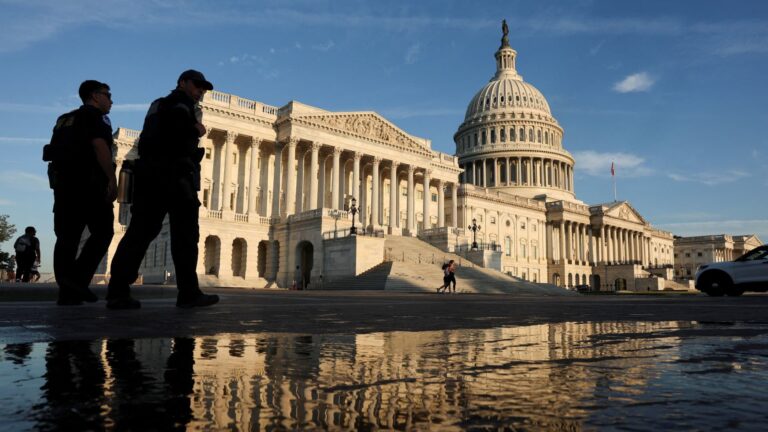Morning light hits the U.S. Capitol hours ahead of a press conference to discuss the Epstein Files Transparency bill, directing the release of the remaining files related to the investigations into Jeffrey Epstein and Ghislaine Maxwell, on Capitol Hill in Washington, D.C., U.S., September 3, 2025.
Jonathan Ernst | Reuters
Congressional lawmakers are already trading blame over the looming government shutdown, foreshadowing what will likely be a bitter partisan dispute over the next several weeks, as funding hangs in the balance.
Lawmakers returned to Capitol Hill this week as the threat of a shutdown at the end of the month intensified, and the familiar partisan fault lines reappeared.
“The House Republicans are committed to keeping the government, and unfortunately, it seems like not all Democrats agree with that, and they’re beginning to apply their government to shut down pressure,” House Speaker Mike Johnson, R-La., told reporters on Wednesday.
“If the government shuts down, it’ll be because congressional Democrats rejected common sense solutions to fund the government,” he said.
Government funding is set to expire in less than four weeks, and lawmakers are divided over how to keep the government afloat, even on a short-term basis.
They will likely consider a stopgap measure to keep funding stable at federal agencies, but even that could face hurdles in the Republicans’ razor-thin conference.
To pass a stopgap measure in the Senate before Sept. 30, the date that funding is set to expire, GOP leaders will need Democratic support to clear the chamber’s 60-vote threshold.
But that will likely be difficult, as Democrats— eager to put the majority party on defense as the 2026 midterm elections near — appear willing to hold the line and spar with their Republican counterparts over marquee pieces of President Donald Trump’s agenda.
Senate Minority Leader Chuck Schumer, D-N.Y., voted with Republicans in March to avert a shutdown, a decision that drew strong backlash from his party. Schumer likely wants to avoid that this time around.
Like Johnson, the senior senator from New York has tried to put the onus for preventing a government shutdown on his colleagues in the other party.
“The only way to avoid a shutdown is to work in a bipartisan way, with a bill that can get both Republican and Democratic votes in the Senate,” he wrote in a letter to his colleagues on Tuesday.
“However, as we near the funding deadline, Republicans are once again threatening to go-at-it-alone – heading our country towards a shutdown,” he said.
The most likely route ahead is for lawmakers to pass a series of short-term funding bills, or continuing resolutions, to help keep federal agencies funded for the next several months.
If lawmakers don’t go the CR route, they would need to debate and pass a dozen full-year spending bills by the end of the month, a near-impossible feat.
The White House has suggested that it backs a so called “clean CR,” which would continue funding at current rates and buy time for lawmakers on Capitol Hill to hammer out a deal before the end of the year, according to Punchbowl News.
Trump has previously shown a willingness to shut down the government in order to avoid having to agree to concessions in negotiations.
But now that his “One, Big, Beautiful Bill Act” has been signed into law, Trump is showing more receptiveness to a short-term measure.
Democrats, however, are dead set on reversing the deep cuts to Medicaid that were included in Trump’s package. And they want this reversal in exchange for giving Republicans the needed votes to avoid the government shutdown.
This puts GOP leadership in a tricky situation, where it needs to reach a deal without giving the impression that Republicans are cutting into Trump’s marquee domestic package.
“If Republicans want Democrats to provide votes to fund the Trump administration, they can start by restoring the health care that they ripped away to finance more tax handouts for billionaires,” Sen. Elizabeth Warren, D-Mass., wrote last week on X, foreshadowing the key Democratic demand in any negotiations.
The White House, which has hailed the policy package as a triumph and a defining feature of Trump’s second term, is unlikely to look kindly on a deal that chips away at the the O.B.B.B.
Trump further complicated potential negotiations last week, when he and Office of Management and Budget Director Russell Vought announced a plan to claw back almost $5 billion in foreign aid funding that Congress had already approved, using a rare legislative vehicle known as a rescission package.
Democrats and even some Republicans were quick to criticize the announcement, with some saying that it is illegal. Critics also said that the 11th hour change will further complicate efforts to reach a deal that averts a shutdown.
“The fact is, advancing the final appropriations bills and avoiding a government shutdown will require a great deal of hard work and collaboration when Congress resumes session next week,” Sen. Lisa Murkowski, R-Alaska, wrote on X.
“These unilateral actions by OMB only threaten the good bipartisan work that has been done in committee and on the floor, and risk throwing the entire process into chaos,” she said.
— CNBC’s Emily Wilkins contributed reporting

